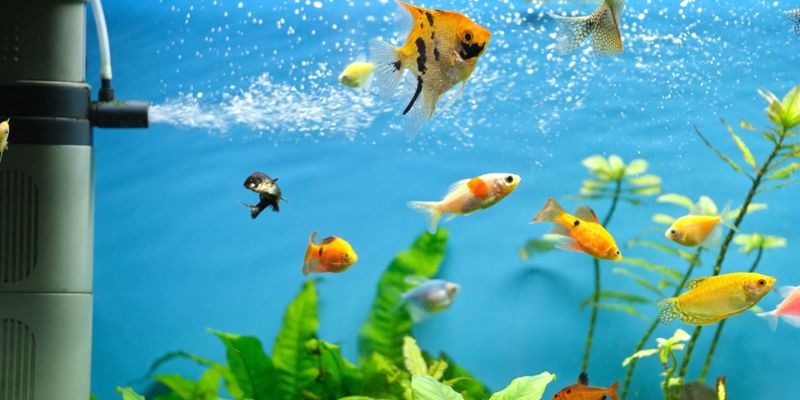Choosing the proper filtration system is crucial to keeping your fish aquarium alive and well. The filtration system is essential for maintaining clean water, removing contaminants, and creating a healthy ecosystem in which your fish can thrive. In this detailed tutorial, we’ll show you “How to Choose the Right Filtration System for a Fish Aquarium?” by considering all the relevant criteria. Come on, then; let’s get started.
Types Of Filtration System for a Fish Aquarium
Machine-made filtering: The first line of defense in purifying water by removing physical debris is the mechanical filter system. Filter media like sponges or pads collect and eliminate unwanted materials including leftover food, fish excrement, and plant matter. These particles will not decompose and contaminate the water if a high-quality mechanical filtering system is used.
Biological Filtration: An aquarium’s filtration system would be incomplete without biological filtration. It uses good bacteria to convert the poisonous ammonia and nitrite to the safer nitrate. Filter media and other aquarium surfaces become colonized by these bacteria, forming a biological ecosystem that regulates water quality. Maintaining fish health over time requires a reliable biological filtration system.
Chemical filtration: It is a great extra for your filtration system, but it’s not required. Dissolved contaminants, smells, and discolorations in water can be eliminated using activated carbon or other chemical media. Chemical filtration isn’t always required, but there are times when it’s helpful, as when you need to get rid of leftover medication or clean tannins out of your driftwood.
How to Choose the Right Filtration System for a Fish Aquarium?
Size and Capacity of Tanks
The type and capacity of filtration system you need depends depend on the dimensions of your aquarium and the volume of water it holds. Choose a filter that can cycle through your tank’s full volume of water four times per hour, as a general rule of thumb. This guarantees efficient filtration and helps keep the water pure.
Populations of Fish and Bioload
The term “bioload” refers to the amount of waste produced by a fish species. Ammonia levels rise because some fish create more excrement than others. When deciding on a filtration system, it’s important to take into account the unique requirements of your fish. You may require a more powerful filtration system, for instance, to deal with the bioload, if you have a well populated aquarium or giant fish that generate substantial waste.
Maintenance and Effective Filtration
Determine how well the filtration system works to rid the water of particles and pollutants while keeping the water clear. Look for filters with variable flow rates so you may modify the filtration to meet the specific needs of your aquarium. The filtration system’s upkeep needs should be taken into account as well. While some filters include material that degrades quickly or need frequent replacement, others can go for much longer without being serviced.
Aesthetics and Noise
Having a loud filtration system can be distracting if your aquarium is in a bedroom or living room. Filters that make a lot of noise are annoying and distracting, especially in peaceful settings. The filter system’s visual appeal should also be thought about. While some filters are clumsy and distracting to the eye, others are made to fit in with the rest of your aquarium’s decor without drawing attention to themselves.
Prices For Filtration Systems:
Prices for filtration systems vary widely, so it’s important to factor that into your decision. However, it is also crucial to evaluate the filtration system’s total cost of ownership. Although some filters have a higher purchase price, they save money in the long run because of their low maintenance requirements or long lasting parts.
Conclusion
If you care about the well-being of your fish and other aquatic pets, you need to give careful consideration to the filtration system you choose for their aquarium. Optimal water quality and a flourishing aquarium environment can be ensured by carefully examining elements including tank size, fish variety, filtration efficiency, and your budget. Always keep in mind that a high-quality filtration system is an investment in the future of your fishkeeping endeavors.


michelin x-ice north 4 205/60 r16 https://www.proalbea.ru/shiny-michelin-preimushhestva-i-nedostatki.html .